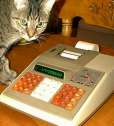Elektronika B3-34
| Datasheet legend
Ab/c:
Fractions calculation
AC: Alternating current BaseN: Number base calculations Card: Magnetic card storage Cmem: Continuous memory Cond: Conditional execution Const: Scientific constants Cplx: Complex number arithmetic DC: Direct current Eqlib: Equation library Exp: Exponential/log functions Fin: Financial functions Grph: Graphing capability Hyp: Hyperbolic functions Ind: Indirect addressing Intg: Numerical integration Jump: Unconditional jump (GOTO) Lbl: Program labels LCD: Liquid Crystal Display LED: Light-Emitting Diode Li-ion: Li-ion rechargeable battery Lreg: Linear regression (2-var. stats) mA: Milliamperes of current Mtrx: Matrix support NiCd: Nickel-Cadmium recharg. batt. NiMH: Nickel-metal-hydrite rech. batt. Prnt: Printer RTC: Real-time clock Sdev: Standard deviation (1-var. stats) Solv: Equation solver Subr: Subroutine call capability Symb: Symbolic computing Tape: Magnetic tape storage Trig: Trigonometric functions Units: Unit conversions VAC: Volts AC VDC: Volts DC |
| ||||||||||||||||||||||||||||||||||||||||||||||||||||||||
Elektronika B3-34
 The B3-34 is is the first of member of the second generation of Soviet-made programmable calculators. It is very similar in appearance to the B3-21, but it is a significantly more sophisticated device.
The B3-34 is is the first of member of the second generation of Soviet-made programmable calculators. It is very similar in appearance to the B3-21, but it is a significantly more sophisticated device.
The B3-34, just as its close relative, the MK-61, is actually a fine, solidly designed, if somewhat slow, programmable calculator. Earlier, I was complaining about the workmanship, but having just replaced the display tube in my B3-34, I found that there was nothing wrong with the workmanship after all. The problems I experienced (uneven brightness of digits, severe crosstalk between digits) were simply a matter of a dying vacuum fluorescent display. (As to how I found spare parts for a vintage Russian programmable calculator, let that remain my secret!)
The B3-34 has 98 steps of program memory and 14 memory registers. Otherwise, it seems to be practically identical to the MK-61. The keyboard layout is almost the same, keycodes are identical, programs appear interchangeable between the two. Which means that you could key in the Gamma function program I wrote for the MK-61 and get the expected results on the B3-34, but where's the fun in that? Here is, instead, another Gamma function implementation, this one using an approximation based on the incomplete Gamma function. Mind you, the practical value of this program is dubious at best; due to the calculator's extreme slow speed of execution, the iteration in this program takes quite a number of minutes to execute. Still, I consider it an educational example that reveals a lot about this calculator's programming model.
00 41 П 1 01 01 1 02 40 П 0 03 25 \(\circlearrowright\) 04 5C x<0 05 16 16 06 60 ИП 0 07 61 ИП 1 08 13 ÷ 09 40 П 0 10 61 ИП 1 11 01 1 12 10 + 13 41 П 1 14 51 БП 15 03 03 16 01 1 17 61 ИП 1 18 11 - 19 5C x<0 20 28 28 21 0L /-/ 22 41 П 1 23 60 ИП 0 24 12 × 25 40 П 0 26 51 БП 27 16 16 28 61 ИП 1 29 02 2 30 04 4 31 24 xy 32 61 ИП 1 33 13 ÷ 34 42 П 2 35 43 П 3 36 02 2 37 04 4 38 61 ИП 1 39 01 1 40 10 + 41 41 П 1 42 13 ÷ 43 62 ИП 2 44 12 × 45 42 П 2 46 10 + 47 0E B^ 48 0E B^ 49 63 ИП 3 50 11 - 51 57 x≠0 52 56 56 53 25 \(\circlearrowright\) 54 51 БП 55 35 35 56 63 ИП 3 57 02 2 58 04 4 59 16 ex 60 13 / 61 60 ИП 0 62 12 × 63 50 C/П 64 51 БП 65 00 00


